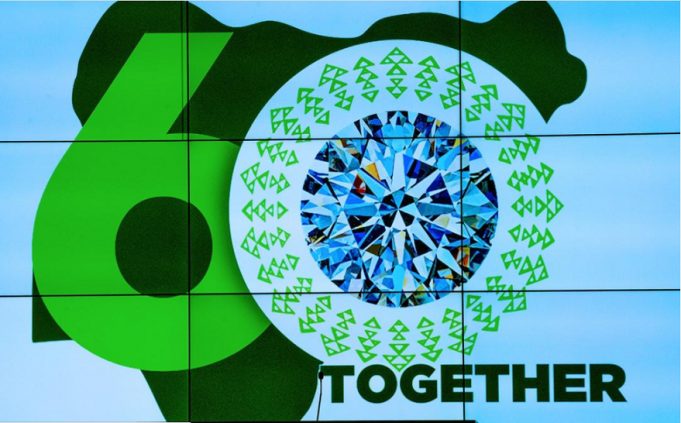Nigeria News
Nigeria A 60: Where is the Country (REALLY) Headed?

Anyone imprudent enough to try to sum up the first 60 years of a nation and then project into the future had the best start with a caveat: there are many Nigerians, both today and tomorrow.
TRENDING NOW
- FG Updates MSME Survival Fund Registration Portal – Apply if you have not
- Recruitment: New Intake at Firstbank Nigeria – Apply Here
- How to Register For SMEDAN Online at www.smedanregister.ng
- What you Must do to be Selected for Survival Fund Application
- Nigerian Army Recruitment for SSCE Applicants 2020 Commenced – See How to Apply
This is part 1 of a series
Lagos State tomorrow could be the buttress of a West African corridor of prosperity stretching through Abidjan to Accra. Kano, once a great city of the north but now on its knees, gains hope from its native son Aliko Dangote and his plans for agriculture.
The Niger Delta’s challenges of oil production and pollution are not the challenges of the Middle Belt, with its herderfarmer clashes. So what do the experts think? In The Africa Report’s 24 September digital event with vice-president Yemi Osinbajo – with an audience of CEOs, diplomats, analysts and concerned citizens – we offered three scenarios for Nigeria’s trajectory: perilous, stumbling about in the middle, or on the right track.
Dictatorship and democracy
Our audience of more than 600 participants in 79 countries – 250 logging in from Nigeria – split into rough thirds. Just 22% argued the country is on the right track, while 33% said the journey is perilous.
Let’s take a happy pill first. No one denies the difficult history of the country, including a civil war from 1967 to 1970 that entrenched an ethno-nationalist split between north, west and south. This led to a period of northern-dominated military rule, culminating in the grotesque corruption and violence of dictator Sani Abacha in the 1990s. What came after, however, was a flowering of democracy and livelihoods. The fightback included historical figures such as the Ransome-Kuti family and Chief MKO Abiola.
An undated file photo of Nigeria’s Chief of Army Staff Major-General Sani Abacha in Lagos, Nigeria. (AP Photo/File)
President Olusegun Obasanjo’s first post-military democratic government turned a page: debt write-offs, the liberalisation of the telecom, banking-sector consolidation and the birth of a class of entrepreneurs supported by a ‘backward integration programme’, which gave local players protection from global market forces in exchange for shifting from importing sugar and cement to producing it.
Yes, progress has been a jagged line, particularly in the policy. The reformist Petroleum Industry Bill has been stuck for a decade, pushing oil production down nearly every year since 2010. But there have been some leaps forward. The Local Content Act of 2010 led to the growth of serious domestic oil industry – Seplat and Oando are just two of a crop of indigenous energy companies, something that other African oil producers cannot match.
End to subsidies
Another great obstacle – infrastructure last refreshed in the 1970s – is being addressed. Nigeria has also finally recently removed subsidies on petrol and caps on electricity tariffs. The first will save the country up to $5bn according to BudgIT, a transparency NGO. The second is helping to keep lights on – “eye-wateringly expensive, but working 18 hours a day,” says one resident of Lagos.
The reforms are stimulating the market for power producers and local refiners. Indeed, the great fanfare of recent months has been around the twin multibillion-dollar refinery projects of BUA Group in September and Dangote’s megaproject, which should go live next year.
The Lekki Peninsula shows the crackling economic energy of Lagos State, with a series of industrial zones opening up. Surrounding states are feeling the glow. Big investments are arriving in the energy sector. NLNG’s Train 7 project is set to boost national natural gas production by 30%. The digital divide does not present the same problem for Nigeria as for its neighbours.
The country enjoys relatively cheap broadband and has overtaken South Africa in hosting tech hubs. Nigeria is also starting to flex its power beyond its borders. Nigerian men and women preside at the African Development Bank and Afreximbank, as deputy secretary-general at the UN – and perhaps even the next head of the World Trade Organisation.
So why did 33% of our participants feel Nigeria’s trajectory was perilous? Much of it is the lived experience, the everyday hustle, crime, corruption and insecurity. Entrepreneurs feel jammed by ever-rising costs and the constant shakedowns of security forces. Many in the middle classes do not see options for their ambitions at home. They now besiege the gates of the Canadian embassy – Nigeria’s best and brightest, siphoned out in a careful selection process.
“In the third quarter of 2015, 27% of Nigeria’s working population was not employed full-time. This number now sits at about 56%,” says Samuel Segun, an analyst at SBM Intelligence. One question from an investor at the September event points a finger at the chronic distrust that raises costs across the board. “Do you still expect investors to invest in Nigeria when the central bank is not honouring any of its commitments to make dollars available to repatriate dividends?” asked Vianney Mathonnet of private-equity firm Kappafrik Group.
Youth challenge
Above and beyond the concerns of the well-heeled are the fates of citizens in the insecure north-east and subsistence farmers far from the tony neighbourhoods of Lagos. Paving the way for the country’s young people is a major challenge. Nigeria has the largest number of children out of school in the world, more than 10 million. Almost half of the country’s more than 190 million people are under 14.
In the north, a vicious circle of poverty, insecurity and climate change is imprisoning a generation with few choices. In the south-east, the chronic neglect of the region that creates two-thirds of Nigeria’s wealth has hardened attitudes towards the centre.
It is unsurprising, then, that people in both regions feel the siren calls of populism, be it religious militancy or national schisms. “Can things hang together?” ask some Nigerians. “Would we be better apart?” The scars of the Frankennation stitched together by British colonialist Lord Lugard are itchy and sore.
Nobel laureate and long-time democracy campaigner Wole Soyinka now agrees with his old foe Obasanjo, writing recently that the nation is a ‘contraption teetering on the brink of total collapse’. He blames the administration of President Buhari: ‘Does anyone deny that it was this president who went to sleep while communities were consistently ravaged by cattle marauders, were raped and displaced in their thousands and turned into beggars all over the landscape?’ asked Soyinka, who argues for a more decentralised and transparent government.
And these are not just flashpoints affecting rural areas. Lagos has the infrastructure for 8-9 million people, says an urban planner in the state government. But, today, there are 20-25 million people living in the city. What happens when the population doubles and the infrastructure doesn’t keep up?
No time for old men
Don’t let the attendant gloom of a coronavirus pandemic prime your predictions, however. Many people at our September event thought that Nigeria would stumble about in the middle. “We will likely be a trillion-dollar economy in the next 50 years,” argued Tobi Lawson, a consultant.
“Perhaps looking something like India, with excellence in certain areas and severe lags in others.” What Lawson decries is a lack of ambition for high-speed growth from the current crop of aged legislators. But even that could change. The ‘Not Too Young To Run’ platform has supported a handful of 30-something elected officials and will create more. These are a critical link – a political class that actually connects with the huge youth bulge when Nigeria’s population hits 400 million in 2050.
The ‘things fall apart’ handwringing may be overdone. One trump card, if correctly played, is the diaspora. China was a basket-case in the 1960s, with a far-flung, rich and skilled diaspora. How Nigeria attracts its own diaspora will surely count over the next 60 years. “A rock pile ceases to be a rock pile the moment a single man contemplates it, bearing within him the image of a cathedral,” argues Ekpen Omonbude of Eraskorp Nigeria, quoting French writer Antoine de Saint-Exupéry.








